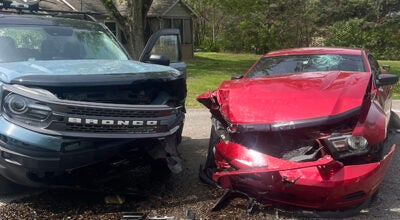Paul Pugh did not start acting out until he was 49
Published 8:16 am Friday, April 9, 2010

Karen Pugh, April 8 Rotary program chair Dee Leversen and Paul Pugh. He is directing “Lilies of the Field,” a play about redemption and resurrection which opened Easter weekend and concludes tonight and Saturday at 7:30 p.m. and Sunday at 2 p.m. at Beckwith Theatre, 100 New York Ave. Tickets cost $10. (The Daily News/John Eby)
By JOHN EBY
Dowagiac Daily News
Passed over for his high school play, Paul Pugh compensated by biding his time until he was 49 and helping found Beckwith Theatre in the spring of 1990.
In its first 20 years, the 110-seat Beckwith produced more than 600 performances of 135 shows.
“Here I am 21 years later,” Pugh told Dowagiac Rotary Club Thursday noon at Elks Lodge 889, not only an accomplished actor, but also a director (including “Lilies of the Field,” continuing this weekend) and playwright with four works presented on the Beckwith stage, including perhaps its most popular production, “The State of Michigan vs. the House of David and Benjamin Purnell,” about the 1927 trial of the Israelite religious sect in Benton Harbor, “Escanaba in Da Moonlight” and “Forever Plaid.”
“When we started this,” he said, “we’re lucky we didn’t know what we were getting into.”
Paul, who performed his “Darrow” as a one-man show, has a bachelor’s degree from Ohio University and a master’s degree from the University of Notre Dame.
He and Karen own Olympia Books. Established in 1987, he reckons it is the second-oldest retail store in Dowagiac after Underwood Shoes.
Karen grew up in Des Moines and came to Dowagiac more than 40 years ago.
Her first apartment was in the Lee Mansion, which sparked her interest in the Grand Old City’s fascinating history.
She worked for 10 years on Historic Dowagiac home tours and coordinated an Orphan Train re-enactment.
After teaching junior high science for a few years at Central, Karen began as a student adviser at Southwestern Michigan College, where she worked for more than 30 years.
While at SMC, she co-chaired Women’s Day activities for 10 years.
She currently works very part-time as an instructor at Pathfinders Alternative and Adult Ed program.
Beckwith, named by Rich Frantz, is a non-profit organization guided by a 15-member board with a waiting list.
“There have been some closings in Michigan recently of community theaters simply because the money isn’t there. Advertising dries up, attendance dries up. As such, it’s always in danger. Keep coming to the shows, folks,” Pugh said. “We’ve had kids grow up with us – Jordan Eby, Kristin Anderson, Aislinn Frantz, Tyler Hall. Nine of our kids have gone into professional theater in some capacity and four are in the process,” including Nick Westrate on Broadway and Aaron Heeter in Chicago, from technical director at Drury Lane to lighting Oprah Winfrey’s show.
Beckwith originally offered dinner theater downtown through Phreddies on the third floor of the old Elks Temple (Wounded Minnow).
“I think 30 people showed up,” he said. “It was sort of like Mickey (Rooney) and Judy (Garland) – ‘Hey! Let’s find a barn and put on a show!’ We’ve had some bombs, what we refer to as the Irish plays. A lot of flailing and keening on stage, which no one really enjoyed. But fun things happened along the way, too. One particular murder mystery we did, there was an inspector and an assistant. They had a spot where the inspector could not remember his lines. He fumbled on stage – we call that tap dancing and farting – until finally he said aloud, ‘I forgot to find the gun in the couch.’ Kind of gave it away. Another time we were doing a play and a lead character got lost and rambled on an on, different parts from different places” in the script.
“Finally,” Pugh revealed with relish reserved for only someone who has found themselves in a similar situation, “He was talking to another character. This second character sat there like a deer about to be struck by a bullet. He said, ‘And that’s all I have to say about that,’ turned and walked off the stage.”
Which answers one of the most persistent questions posed to the town’s thespians: How do you remember all those lines?
“We don’t,” Karen admitted.
“Everyone has moments like that,” Paul said, adding quickly, “Don’t I?” before his wife can get the last word.
Some stories touch the cast.
“I don’t remember the play,” Paul said, “but this elderly lady came up with tears in her eyes. She said, ‘I’m 85 years old and I’ve never been to live theater. Look at all I’ve missed.’ ”
But that’s only one reason why they do it. Mostly, “It’s fun,” said Karen of a pursuit Paul compares to mountain climbing.
“If you slip, you’re on your own,” he said. “But if you’re climbing with someone else, hopefully, they’ll have a line on you and they’ll catch you. The camaraderie – sorry, Rotarians – but you never get so close to other people that you’ve met for the first time.”
“Going back to the idea of dropping a line or getting lost on stage,” Karen continued, “There’s a trust element there, a reliance on the other person, that sometimes doesn’t come with just being on a committee together or working in an office together. You literally have to bail that other person out once in a while. We wouldn’t be where we are today without the participation of a lot of people, a lot of volunteers,” such as Rotarian Soni Smith stepping in for the late Marion Weaver to organize refreshments and seating audiences.
“You can be involved in theater” even if the idea of trying to remember lines on stage petrifies you, Karen said, adding, “though it is a lot of fun and everyone ought to try it one time. You get the bug. That’s what happened to us.”
And to Jack Gannon, who divides his time between Chicago and a Sister Lakes home.
Paul pointed him out in an audience and encouraged him to try out for the House of David.
Gannon ended up playing an attorney and caught the bug.
“He drove regularly from Chicago,” Karen recalled. “Then he got his brother-in-law involved. When we did the cemetery tour last fall, Jack, his wife and his brother-in-law were all in it.”
“Jack has done, I think, three different productions in Chicago and had the lead in one of them, so he’s into it full time,” Paul said.
Marilu Franks said her well-traveled sister-in-law from St. Paul, Minn., came away from Beckwith “raving that a small town like Dowagiac could put on such a good play and there were even good spaces to park close by.”
When Beckwith moved to the former Methodist Church acquired for $30,000 from the Knights of Columbus, its lighting consisted of flood lights in coffee cans.
“You don’t look too good under flood lights,” Paul said.
Beckwith also spent $8,000 adding a handicap access.
Prosecutor Victor Fitz asked how the Beckwith decides what plays to offer.
Pugh said the board about June will set the 2010-2011 season, when there might be another “Escanaba” play to consider.
If someone offers to direct a particular play, that can help get it on the playbill.
Musicals are expensive, but the Beckwith tries to stage one each year.
“This year we’re fortunate to get the rights to ‘The 25th Annual Putnam County Spelling Bee,’ which just finished on Broadway and hasn’t been anywhere in the area,” Paul said. “It’s really funny.”
“Playing Doctor” was supposed to be coming up in May, but “we didn’t get enough men out for it to cast it,” Paul said.
“The committee does listen,” Karen said. “Forever Plaid (which Dr. Fred Mathews said was as good as the Chicago version) and Escanaba in Da Moonlight were brought back. The popularity of the cemetery tour surprised us, so that’s going to come back next fall.”
Karen, the history buff, notes that a major renovation in 1909 removed the church steeple.
Also, that triangle parcel held the town school and was used for church services.
Children arriving on the first Orphan Train in 1854 walked there to meet families.
Paul said there was a play written about the Orphan Train, “but I haven’t had a chance to read it to see if it’s any good. By the way, when I die, I’ve done a piece where I will be present in an urn.”
Although past Dogwood Fine Arts Festival president Chuck Ringland pronounced “Lilies of the Field” a “terrific play” he and Ann saw opening night, Pugh said, “It’s a difficult play to do because so much of it depends on narration, which you don’t mind when Tony Meloche does it. They get better with every production. If you saw it (April 2), you might want to come back again. I think Sunday was our best show. It was like (the cast) suddenly got it.”






